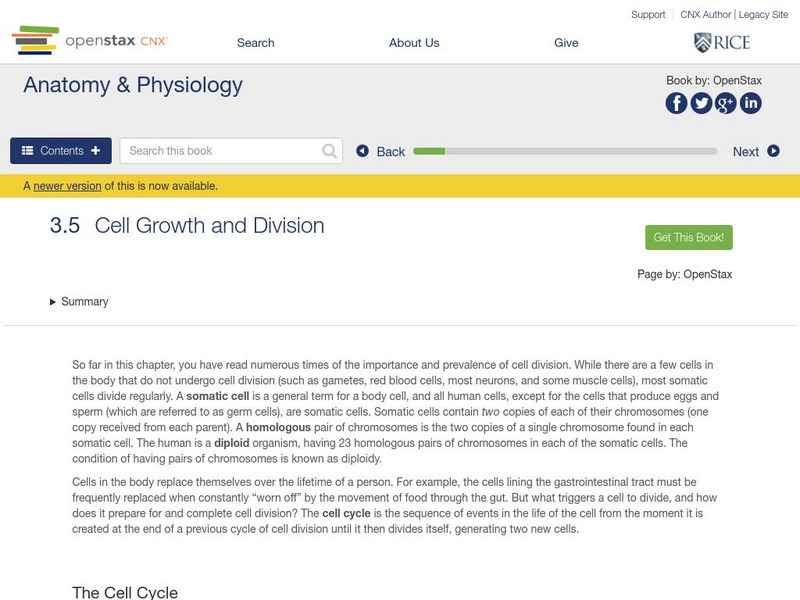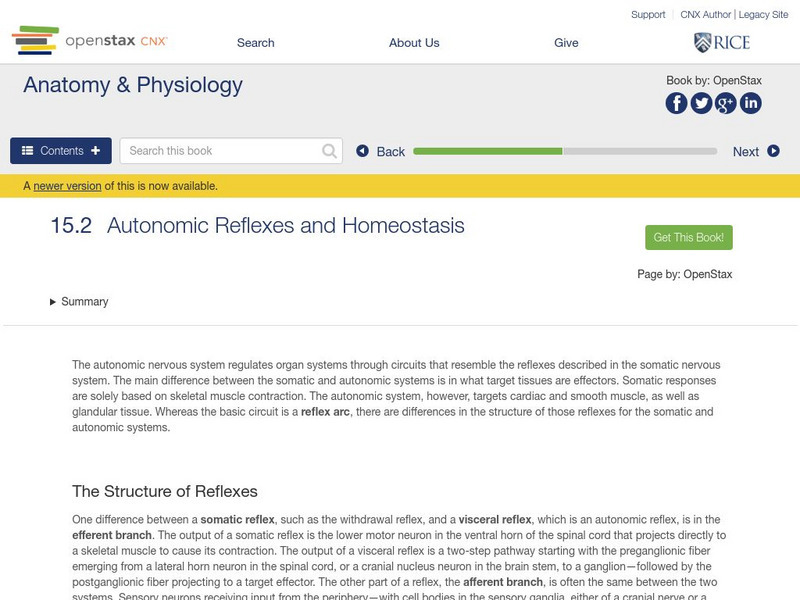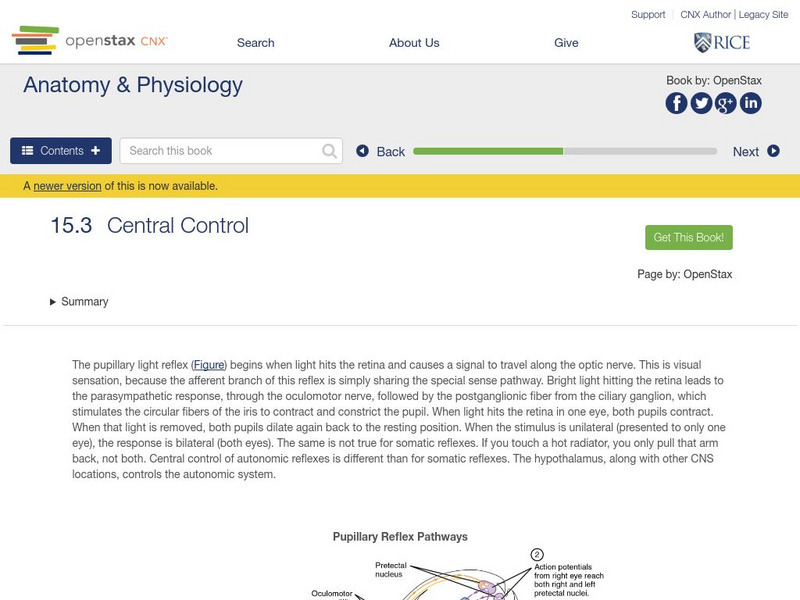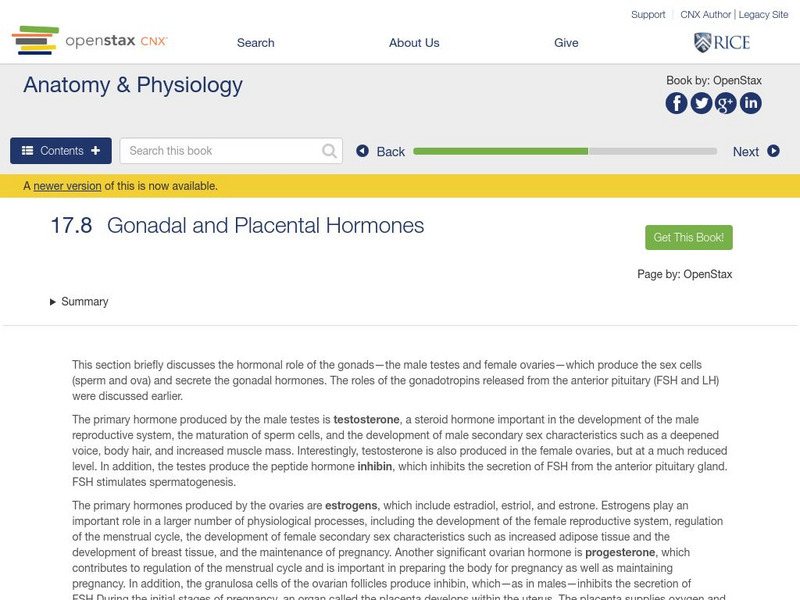OpenStax
Open Stax: Cell Growth and Division
The following site provides information regarding the process of cell growth and division.
OpenStax
Open Stax: Cellular Differentiation
The process of cellular differentiation leads cells to assume their final morphology and physiology - learn here all about this process.
OpenStax
Open Stax: Bone Structure
In this site we examine bone structure. Examine bone cells, markings, tissues and various types of bones.
OpenStax
Open Stax: Bone Formation and Development
This learning module explains bone formation and development. Learn about cartiage, intramembranous ossification, endochondral ossification and bone remodeling.
OpenStax
Open Stax: Bones of the Upper Limb
Learn here about the bones of the upper limb. The upper limb is divided into three regions. These consist of the arm, located between the shoulder and elbow joints; the forearm, which is between the elbow and wrist joints; and the hand,...
OpenStax
Open Stax: Bones of the Lower Limb
Learn here all about the bones that make up the lower limb: the thigh, leg and foot.
OpenStax
Open Stax: Classification of Joints
This site provides information regarding the classification of joints. A joint, also called an articulation, is any place where adjacent bones or bone and cartilage come together to form a connection.
OpenStax
Open Stax: Anatomy of Selected Synovial Joints
This site examines the anatomy of selected synovial joints of the body.
OpenStax
Open Stax: Axial Muscles of the Head, Neck, and Back
The skeletal muscles are divided into two categories: the axial, muscles of the trunk and head, and the appendicular, muscles of the arms and legs. Learn here all about the axial muscles.
OpenStax
Open Stax: Axial Muscles of the Abdominal Wall and Thorax
It is a complex job to balance the body on two feet and walk upright. Learn here all about the axial muscles of the abdominal wall and thorax.
OpenStax
Open Stax: Appendicular Muscles of the Pelvic Girdle and Lower Limbs
This site provides interactive information regarding the appendicular muscles of the pelvic girdle and lower limbs.
OpenStax
Open Stax: Basic Structure and Function of the Nervous System
Learn here about the basic structure and function of the nervous system.
OpenStax
Open Stax: Anatomy and Physiology: Homeostatic Regulation of Vascular System
Students can learn about the homeostatic regulation of the vascular system, and find out how exercise affects it.
OpenStax
Open Stax: Anatomy and Physiology:diseases Depressed/overactive Immune Response
This section is about how the immune system goes wrong. When it goes haywire, and becomes too weak or too strong, it leads to a state of disease. The factors that maintain immunological homeostasis are complex and incompletely understood.
OpenStax
Open Stax: Anatomy and Physiology: Tubular Reabsorption
Lists specific transport mechanisms occurring in different parts of the nephron, including active transport, osmosis, facilitated diffusion, and passive electrochemical gradients.
OpenStax
Open Stax: u.s. History 1968 1980: Identity Politics in a Fractured Society
Discussion of identity politics during the 1960s and 1970s in which underrepresented and marginalized groups organized to fight discrimination and challenge the established political and social culture. Page contains questions for...
OpenStax
Open Stax: Anatomy & Physiology: An Overview of the Endocrine System
Find out about the types of intercellular communication, their importance, mechanisms, and effects. Then continue on to the next sections to learn about hormones, the different endocrine glands, the organs with secondary endocrine...
OpenStax
Open Stax: Anatomy & Physiology: Autonomic Reflexes and Homeostasis
Looks at how to determine the effect of the autonomic nervous system on the regulation of the various organ systems on the basis of the signaling molecules involved.
OpenStax
Open Stax: Anatomy & Physiology: Central Control
Students investigate the role of higher centers of the brain in autonomic regulation.
OpenStax
Open Stax: Anatomy & Physiology: Drugs That Affect the Autonomic System
Students learn about the classes of pharmaceuticals that interact with the autonomic nervous system, and then relate the consequences of nicotine abuse with respect to autonomic control of the cardiovascular system.
OpenStax
Open Stax: Anatomy & Physiology: Gonadal and Placental Hormones
Students will identify the most important hormones produced by the testes and ovaries, and learn about the hormones produced by the placenta.
OpenStax
Open Stax: Anatomy & Physiology: Acid Base Balance
Students learn how buffer systems in the body - the respiratory and the renal - affect the blood pH.
OpenStax
Open Stax: A New Political Style: From John Quincy Adams to Andrew Jackson
By reading this section of a chapter on "Jacksonian Democracy," students will be able to explain and illustrate the new style of American politics in the 1820s, describe the policies of John Quincy Adams's presidency and explain the...
OpenStax
Open Stax: A New Social Order: Class Divisions
By reading this section of a chapter on "Industrial Transformation in the North," students will learn about the shared perceptions and ideals of each social class and be able to assess different social classes' views of slavery.

























